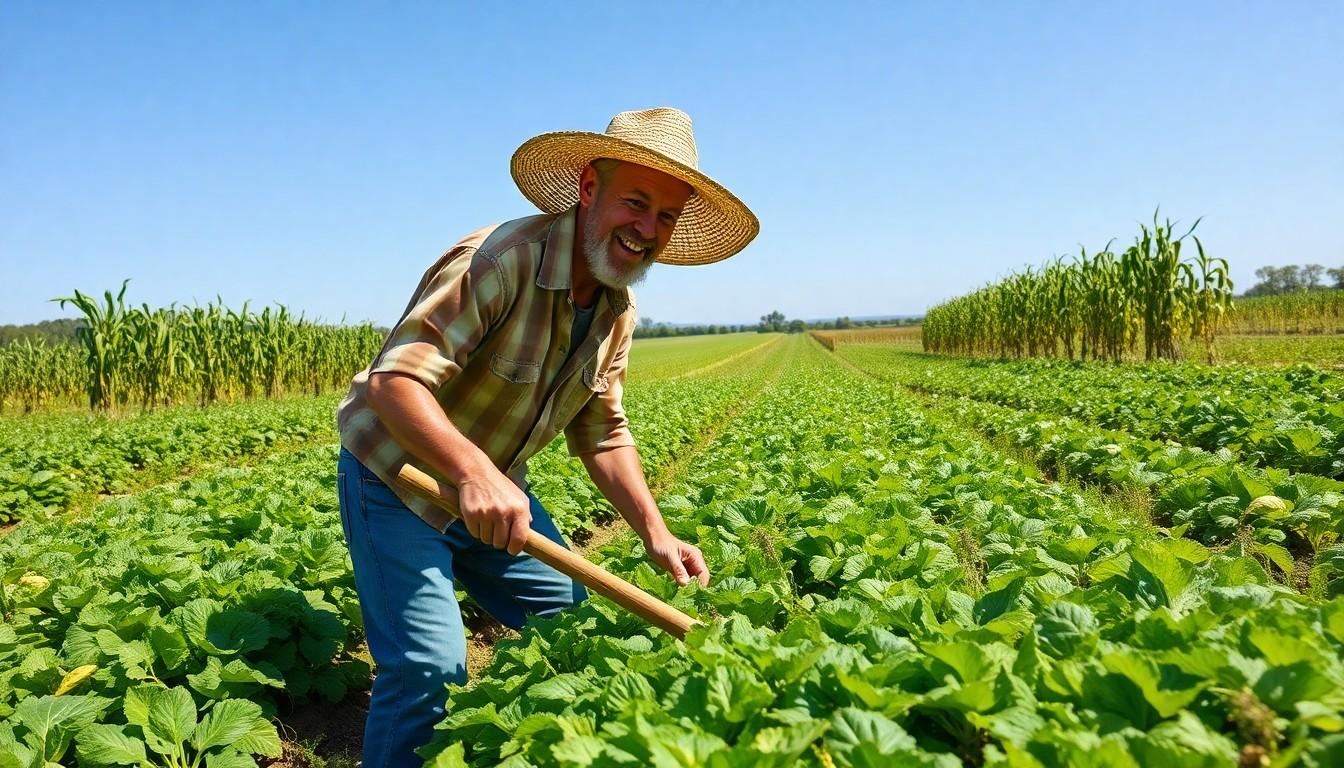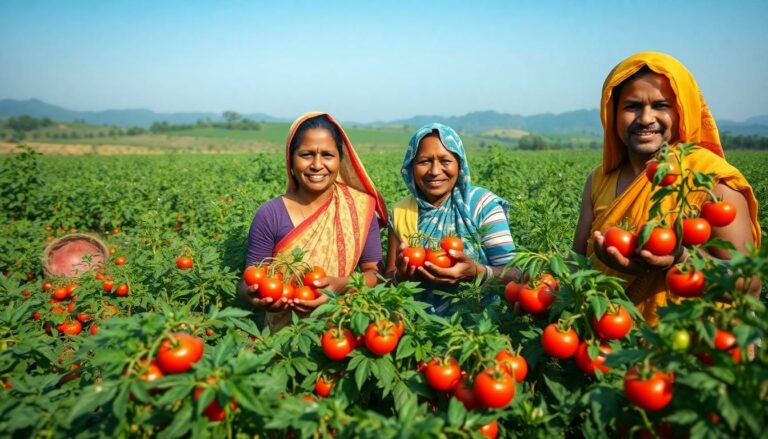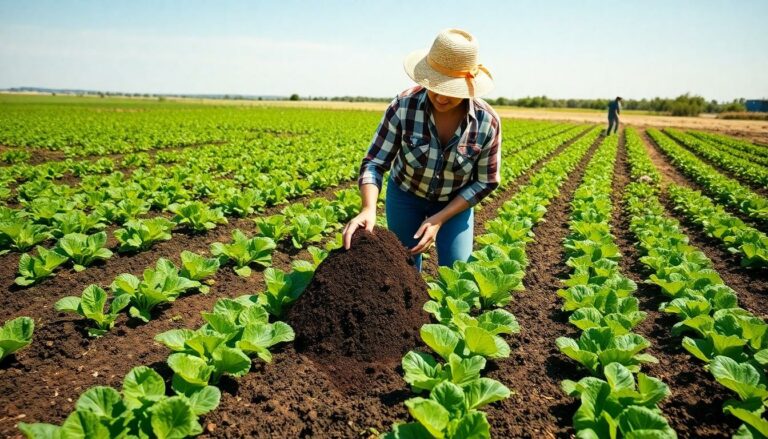In a world where “organic” seems to be the buzzword of the decade, understanding its true meaning can feel like deciphering a secret code. Organic farming isn’t just about avoiding pesticides or hugging trees—it’s a holistic approach that respects nature while producing food that’s as wholesome as grandma’s home-cooked meals. Imagine a farm where the only thing flying through the air is the sound of happy chickens and the occasional cow mooing in approval.
But what does it really mean to go organic? It’s not just a trendy label slapped on your favorite salad mix. It’s a commitment to sustainability, biodiversity, and keeping that pesky synthetic fertilizer at bay. So grab your gardening gloves and join the organic revolution, where every bite is not just delicious but also a step towards a healthier planet. Who knew farming could be both fun and eco-friendly?
Organic Farming Meaning
Organic farming encompasses a method of agriculture that prioritizes environmental health and sustainability. It promotes practices that feed ecosystems rather than deplete them. Organic methods include crop rotation, composting, and natural pest control, fostering biodiversity in the farming process. This approach ensures food free from synthetic chemicals and pesticides, contributing to healthier food options.
Farmers practicing organic agriculture focus on soil health, utilizing organic fertilizers and natural amendments to enrich the earth. Additionally, organic farming supports animal welfare by providing livestock with humane living conditions and access to the outdoors. Transitioning to organic systems often improves resilience against climate challenges by enhancing soil structure and promoting healthy ecosystems.
Organic standards, defined by certifying organizations, vary by region but typically prohibit the use of synthetic fertilizers, GMOs, and harmful pesticides. Compliance with these standards ensures that consumers receive products consistent with organic principles. Through this commitment to responsible farming, organic agriculture not only yields nutritious food but also nurtures the planet.
Research shows that organic practices can also lead to reduced greenhouse gas emissions, making it a viable solution to combat climate change. Choosing organic food contributes to a healthier lifestyle while supporting sustainable farming practices. Shifting consumer preferences towards organic products drives demand for eco-friendly farming methods, reinforcing the importance of the organic movement in today’s food systems.
Principles of Organic Farming

Organic farming centers on promoting ecological balance and health through specific practices. This approach not only protects crop yields but also enhances the ecosystem’s overall well-being.
Biodiversity and Sustainability
Biodiversity serves as a cornerstone of organic farming. It encourages a diverse range of plants and animals, fostering ecosystems that thrive naturally. Organic methods prevent the use of harmful pesticides, enabling natural predators to control pest populations effectively. Sustainable practices, such as crop rotation and intercropping, promote resilience against diseases and environmental stresses. Ecological balance leads to better yield stability over time, while supporting a variety of beneficial organisms. Research indicates that increased biodiversity can enhance soil health and reduce the need for chemical inputs, aligning organic farming with environmental sustainability.
Soil Health and Fertility
Soil health plays a crucial role in organic farming success. Organic farmers prioritize using natural fertilizers like compost and green manure to enhance nutrient availability. Practices such as cover cropping improve soil structure and organic matter content. Crop rotation helps prevent nutrient depletion, while promoting beneficial microbial activity within the soil. Healthy soils support robust plant growth, allowing crops to resist pests and diseases effectively. Certified organic farming standards prohibit synthetic fertilizers, ensuring that soil ecosystems remain vibrant and sustainable. Enhanced soil health contributes to improved water retention and reduces erosion, benefiting both crops and the environment.
Benefits of Organic Farming

Organic farming offers substantial advantages for the environment and human health. These benefits resonate deeply with consumers who prioritize sustainability and wellness.
Environmental Impact
Organic farming significantly reduces pollution by eliminating synthetic fertilizers and pesticides. Practices like crop rotation and composting enhance soil quality, fostering biodiversity. Crop diversity enriches ecosystems, encouraging beneficial insects and natural pest control. Research shows that organic methods can lower greenhouse gas emissions, making it an effective strategy against climate change. These techniques also improve water retention in soil, reducing erosion and conserving water resources. Overall, organic farming promotes healthier ecosystems while maintaining productive agricultural practices.
Health Benefits
Organic food often contains higher levels of nutrients compared to conventionally grown counterparts. Studies indicate that organic fruits and vegetables bear fewer pesticide residues, resulting in cleaner, safer options for consumers. Eating organic can support a balanced diet, as many products boast richer flavors and vibrant color. Organic farming practices avoid the use of genetically modified organisms (GMOs), allowing for more natural food varieties. Additionally, consumers report improved overall well-being when choosing organic, reinforcing the connection between diet and health. Organic farming ultimately prioritizes nutritional integrity while ensuring food safety.
Challenges in Organic Farming
Organic farming faces several challenges. Pest management presents significant difficulties, as organic farmers rely on natural methods to control pests. Traditional pesticides are prohibited, so farmers often use techniques like crop rotation and biological pest control. These strategies can be less effective and may require more labor and observation. Farmers may also face crop yield losses due to pest outbreaks. Effective training and education on integrated pest management remain essential for success in this area.
Market access poses another challenge for organic farmers. Certification processes can be lengthy and costly, limiting the number of farmers who can enter the organic market. Consumers demand transparency about production practices, requiring farmers to maintain rigorous records. Distribution networks often favor conventional products, making it harder for organic farmers to get their goods to market. Building relationships with retailers and consumers is essential for overcoming these barriers, and farmers benefit from participation in local farmer’s markets and co-ops to increase accessibility.
Choosing Organic Products
Embracing organic farming means supporting a sustainable future for both the planet and its inhabitants. By prioritizing practices that enhance biodiversity and soil health, organic farmers contribute to healthier ecosystems. The movement isn’t just about food; it’s about fostering a connection with nature and making conscious choices that benefit everyone.
While challenges exist in pest management and market access, the benefits of organic farming far outweigh the obstacles. Consumers play a vital role in this journey by choosing organic products and advocating for sustainable practices. Together, they can help create a more resilient food system that nourishes both people and the environment.




